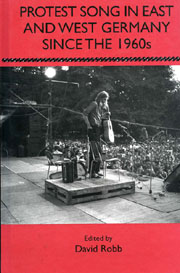Book contents
- Frontmatter
- Contents
- Acknowledgments
- Introduction
- 1 The Reception of Vormärz and 1848 Revolutionary Song in West Germany and the GDR
- 2 Mühsam, Brecht, Eisler, and the Twentieth-Century Revolutionary Heritage
- 3 Narrative Role-Play as Communication Strategy in German Protest Song
- 4 The Burg Waldeck Festivals, 1964–1969
- 5 The Folk and Liedermacher Scene in the Federal Republic in the 1970s and 1980s
- 6 Konstantin Wecker: Political Songs between Anarchy and Humanity
- 7 Wolf Biermann: Die Heimat ist weit
- 8 Political Song in the GDR: The Cat-and-Mouse Game with Censorship and Institutions
- 9 The Demise of Political Song and the New Discourse of Techno in the Berlin Republic
- Works Cited
- Notes on the Editor and Contributors
- Index
6 - Konstantin Wecker: Political Songs between Anarchy and Humanity
Published online by Cambridge University Press: 05 February 2013
- Frontmatter
- Contents
- Acknowledgments
- Introduction
- 1 The Reception of Vormärz and 1848 Revolutionary Song in West Germany and the GDR
- 2 Mühsam, Brecht, Eisler, and the Twentieth-Century Revolutionary Heritage
- 3 Narrative Role-Play as Communication Strategy in German Protest Song
- 4 The Burg Waldeck Festivals, 1964–1969
- 5 The Folk and Liedermacher Scene in the Federal Republic in the 1970s and 1980s
- 6 Konstantin Wecker: Political Songs between Anarchy and Humanity
- 7 Wolf Biermann: Die Heimat ist weit
- 8 Political Song in the GDR: The Cat-and-Mouse Game with Censorship and Institutions
- 9 The Demise of Political Song and the New Discourse of Techno in the Berlin Republic
- Works Cited
- Notes on the Editor and Contributors
- Index
Summary
When in 1977 the Bavarian singer-songwriter Konstantin Wecker (born 1947) made his breakthrough with his song “Willy,” he was at once categorized as a political singer, following in the footsteps of the singer-songwriters of the student movement. As a result, political parties of the left tried to monopolize him, while for the right-wing scene he developed into “eine Haßfigur.” “Willy,” a talking-blues about the death of a young man who was killed during an argument with neo-Nazis, has always been regarded as a political song. However, Wecker himself has quite a different view of “Willy.” The song, he declares, relates to a real event, and also has traces of autobiography. More than a political song, he considers it an emotional expression of an intense personal experience. In an interview in 1998, Wecker explained: “Das Lied ‘Willy’ ist zwar ein politisches Lied, aber es ist ein innerliches Lied. Es geht um eine, ja eine Liebesbeziehung zu einem Freund und um einen großen Zwiespalt in der eigenen Seele.”
The different viewpoints on “Willy” reveal a general peculiarity of Wecker's political songs: although they express criticism of the political system, the key issue of Wecker's thinking and writing has always been the self-determination of the individual, and very clearly of Wecker himself. In his political songs, Wecker is not concerned with political ideologies, which, on the contrary, he disdains. His songs are therefore different from those of political singer-songwriters of the late 1960s and 1970s such as Degenhardt, Mossmann, and Süverkrüp.
- Type
- Chapter
- Information
- Protest Song in East and West Germany since the 1960s , pp. 169 - 198Publisher: Boydell & BrewerPrint publication year: 2007

